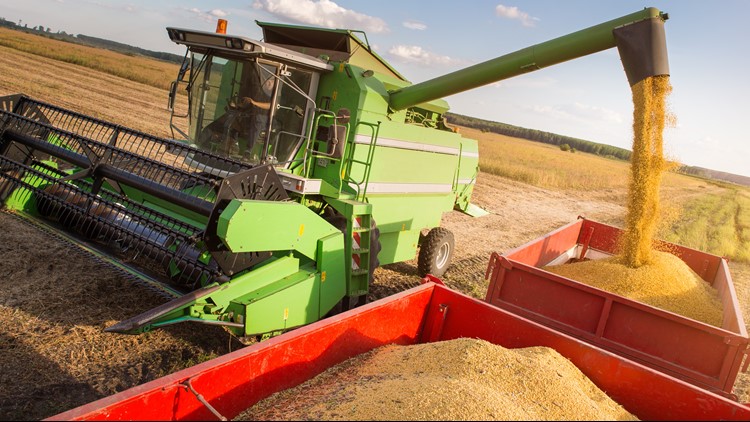GOLDEN VALLEY, Minn. - The soybean sales pipeline from Minnesota to China has slowed from a gush to barely a trickle, and it’s farmers who are paying the price.
China’s tariffs, which came as a response to tariffs President Trump previously set, are provinng to be devastating for MN soybean farmers. A recent article from the New York Times calls China the largest market for America’s largest export, which is soybeans. The latest federal data, the Times said, shows that soybean sales to China have declined by 94 percent from last year’s harvest.
Michael Petefish is a farmer from Claremont, Minn., and he is also the president of the Minnesota Soybean Growers Association. He says U.S. soybeans are some of the best in the world, but we need a level playing field to be successful.
“Farmers have been dealing with low commodity prices and high input costs for the last five years, but now only worsened by the tariff impact,” Petefish said. “Minnesota soybean farmers want to be able to sell their product for a fair, competitive price.”
President Trump’s tariffs were imposed back in July of this year. Trump set tariffs on $250 billion worth of Chinese goods and threatened to tax U.S. exports from China worth roughly $500 billion.
China responded with tariffs of their own on $110 billion in U.S. goods. China’s tariffs affected Minnesota farmers greatly, especially soybean farmers.
Jeffrey Phillips of the Minnesota Department of Agriculture knows Minnesota sends a lot to China.
“We’re definitely in the top 10 for states who will see the biggest impact if this [tariffs] happens,” Phillips said in a June KARE 11 article.
Unfortunately now, the impact is even greater with the largest soybean crop the U.S. has ever seen, according to a Thursday report by the USDA.
When the Trump tariffs were imposed in July, soybean prices dropped to a nine-year low.
The Star Tribune reported that tariffs from China have cost U.S. soybean farmers money, their market and their livelihood. The Tribune wrote that the cost of soybeans is under the break-even point of $9 a bushel by a dollar and eighty cents.
Any soybeans that aren’t sold from Minnesota won’t go bad, Petefish says. There is “virtually no outside storage” for soybeans in Minnesota. Corn and Soybean Digest said in 2007 that soybeans can be stored in a silo for up to 18 months.
As of right now, a federal aid package is helping Minnesota soybean farmers scrape by until all soybeans are sold. But Secretary of Agriculture Sonny Perdue said late last month that the Department of Agriculture will not extend its aid package into 2019, according to Reuters.
One option for soybean farmers in Minnesota is to find other countries who will buy their product. Petefish says that Iran became one of the largest buyers of U.S. soybeans between August and September this year. New sanctions recently proposed by Trump would not affect agricultural business with Iran, according to Bloomberg.
Another big new buyer for Minnesota soybeans in particular is Taiwan. The CEO of Minnesota Soybean and the Minnesota Department of Agriculture went on a trade mission to Taiwan in July.
Two months later, Taiwan signed a letter of intent to purchase more than a billion and a half dollars of soybeans from farmers in Minnesota and Iowa over the next two years, according to a press release from Minnesota Soybean.
A Taiwanese delegation plans to purchase between 3.2 million and 3.9 million metric tons of soybeans between 2018 and 2019. The pledged maximum value of the purchase is to be approximately 3.75 million acres of soybeans.
Earlier in the year, Taiwan made its biggest purchase of U.S. soybeans in 15 years by buying three panamax vessels of soybeans from the Pacific Northwest. That’s 6.3 million bushels of soybeans.
But, American soybean farmers still haven’t forgotten about the big one that appears to have gotten away - China.
President Trump said on Friday that he might reach a deal with Chinese President Xi Jinping. He said China “very much” wants to do a deal. China seems to feel the same way.
According to a BBC report published on Monday, China says they will cut tariffs on imports even more than they already have. It’s part of an effort to open China’s economy back up to face the critics that call China’s trade practices unfair. Chinese President Xi Jinping said at a recent Shanghai trade expo that “an inclusive growth for all is surely the right way forward.”
As for what Minnesota farmers are planning to do? “We don't know what the outcome will be in the next five years," Petefish reflects, "but we can only continue to push for trade agreements and compromise in order to keep family farms, young and old, in business.”



